Chegg Bundle
Can Chegg's Sales and Marketing Strategy Outsmart the Competition?
In the ever-evolving ed-tech arena, Chegg's ability to adapt its Chegg SWOT Analysis is crucial for survival. A recent brand marketing campaign has been launched to attract new users and boost conversion rates. This strategic shift, combined with legal challenges, highlights Chegg's proactive approach in a competitive landscape.
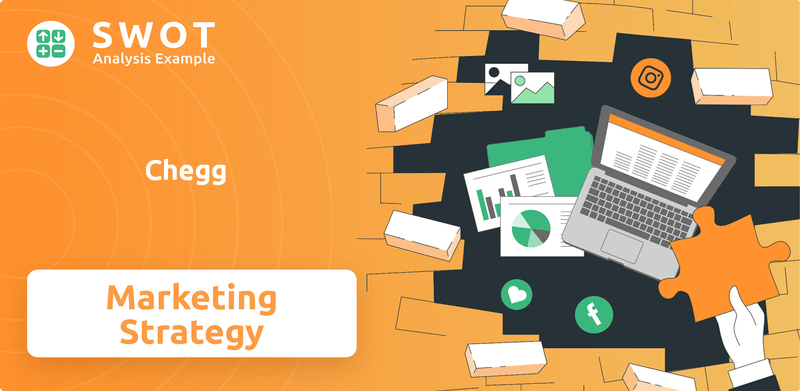
Chegg's sales strategy focuses on a student-first approach, offering a comprehensive learning platform. Understanding the Chegg business model and its evolution from textbook rentals to a digital service provider is key to grasping its current challenges and opportunities. This analysis will explore Chegg's marketing strategy, examining its tactics, brand positioning, and the effectiveness of its campaigns amidst declining revenues and fierce competition from Chegg competitors.
How Does Chegg Reach Its Customers?
The company's sales channels primarily revolve around its online presence. The company website serves as the central hub, evolving from its origins as a textbook rental service to a digital education portal. This shift is evident in its subscription services, which include offerings like Chegg Study Pack and Chegg Writing.
The company's strategy has evolved beyond direct-to-consumer acquisition. Chegg is expanding its business-to-institution (B2I) pilot program, aiming to support a broader range of students by partnering with educational institutions. Furthermore, the company is exploring content licensing deals with AI companies, leveraging its extensive content library through partnerships.
The company is also focusing on international expansion. Mexico is its first fully localized market, with plans to expand into Canada, Australia, the United Kingdom, Turkey, and South Korea. These initiatives reflect a multi-faceted approach to reach and serve its target audience.
The company's primary sales channel is its website, where it offers a variety of digital services and textbook rentals directly to students. This direct approach allows for a streamlined sales process and direct engagement with its customer base. This is a key aspect of the Growth Strategy of Chegg.
Subscription services, such as Chegg Study, Chegg Writing, and Chegg Math, are crucial for revenue generation. These services provide recurring revenue streams and foster customer loyalty. The subscription model is a core element of the company's business model, providing consistent revenue.
The B2I program, which began in late 2024, represents a strategic shift towards partnerships with educational institutions. As of Q1 2025, the B2I program expanded from five to 15 pilot programs, with a target of 40 by year-end. This expansion is designed to tap into new revenue streams and support a wider range of students.
The company is also exploring content licensing deals with AI companies. In Q1 2025, it secured $4 million in revenue from two such agreements, with an expectation of another $7 million in Q2 2025. This strategy leverages its extensive content library through partnerships, diversifying revenue streams.
The company plans to expand internationally, with Mexico being its first fully localized market. Future plans include expansion into Canada, Australia, the United Kingdom, Turkey, and South Korea. This expansion strategy is designed to increase its global reach and tap into new markets.
- Mexico is the first fully localized market.
- Future expansion includes Canada, Australia, the UK, Turkey, and South Korea.
- This strategy aims to increase global reach.
- Expansion is a key part of its marketing strategy.
Chegg SWOT Analysis
- Complete SWOT Breakdown
- Fully Customizable
- Editable in Excel & Word
- Professional Formatting
- Investor-Ready Format
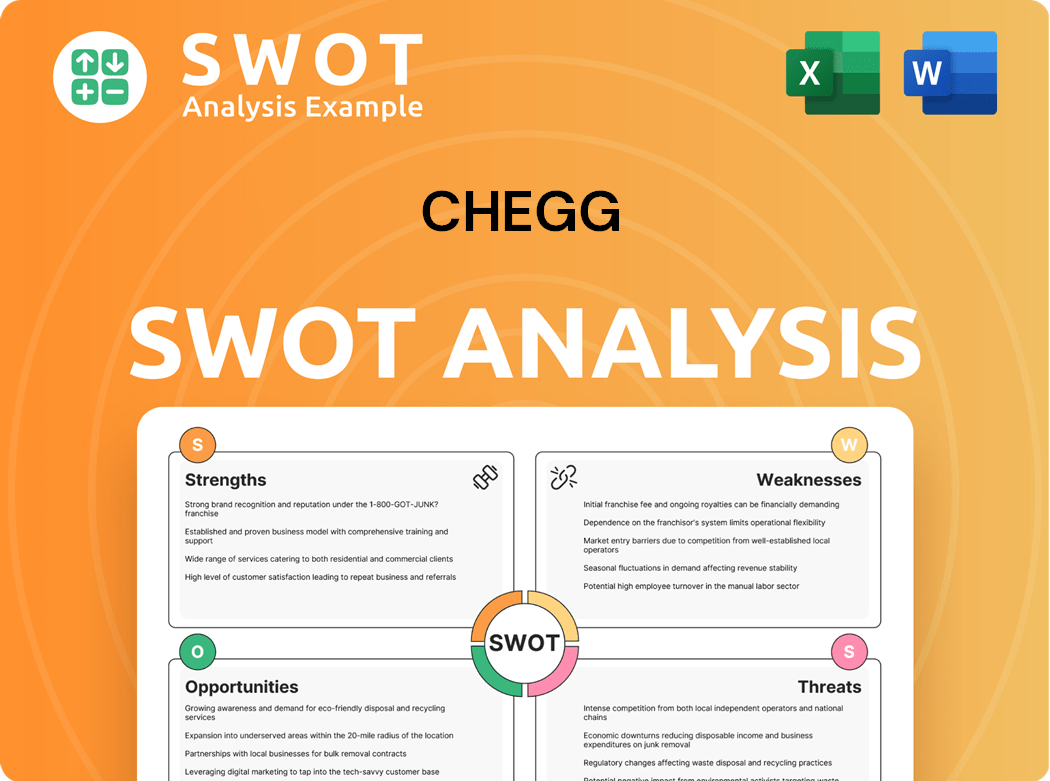
What Marketing Tactics Does Chegg Use?
The marketing tactics employed by the company are multifaceted, encompassing both digital and traditional strategies. The core objective is to build brand awareness, drive qualified traffic, and increase conversion rates. This approach is a critical component of its 2025 strategy, emphasizing a comprehensive, data-driven approach to reach its target audience.
Digital channels play a crucial role, with content marketing, SEO, paid advertising, email marketing, influencer partnerships, and social media forming the backbone of its online presence. Furthermore, the company has integrated AI and machine learning into its marketing efforts, leveraging third-party AI models to personalize content recommendations and streamline search functionalities.
A significant aspect of its marketing strategy involves strategic investment in brand marketing campaigns. These campaigns are designed to reinvigorate top-of-funnel traffic, creating strong consideration and driving conversions. This comprehensive approach, often referred to as 'full funnel' marketing, suggests a multi-channel strategy that may include various media platforms.
The company uses a blend of digital marketing tactics. These include content marketing, SEO, paid advertising, and social media to build awareness and drive sales.
AI and machine learning are integrated into the product stack and marketing efforts. This includes personalized content recommendations and streamlined search functionalities.
Strategic investment in brand marketing campaigns is a key focus. These campaigns aim to increase top-of-funnel traffic and drive conversions.
Data-driven marketing is utilized to deliver relevant and engaging campaigns. Insights into student behaviors are used to inform marketing strategies.
The 'full funnel' marketing approach suggests a comprehensive strategy. This may include various media channels beyond digital platforms.
A brand marketing campaign in the second half of 2024 increased awareness among underclassmen by 16% through TikTok. This success led to increased investment in 2025.
The company's marketing tactics are designed to enhance its Growth Strategy of Chegg. These tactics focus on digital channels, AI integration, and data-driven insights to reach its target audience effectively.
- Digital Marketing: Utilizes content marketing, SEO, paid advertising, email marketing, influencer partnerships, and social media to build brand awareness and drive sales.
- AI Integration: Leverages AI and machine learning for personalized content recommendations and streamlined search functionalities.
- Brand Marketing Campaigns: Invests in campaigns to increase top-of-funnel traffic and drive conversions.
- Data-Driven Marketing: Employs data analytics to understand student behaviors and deliver relevant campaigns.
- Full-Funnel Approach: Implements a comprehensive marketing strategy across various channels.
- Campaign Performance: Achieved a 16% increase in awareness among underclassmen through TikTok in a 2024 campaign.
Chegg PESTLE Analysis
- Covers All 6 PESTLE Categories
- No Research Needed – Save Hours of Work
- Built by Experts, Trusted by Consultants
- Instant Download, Ready to Use
- 100% Editable, Fully Customizable
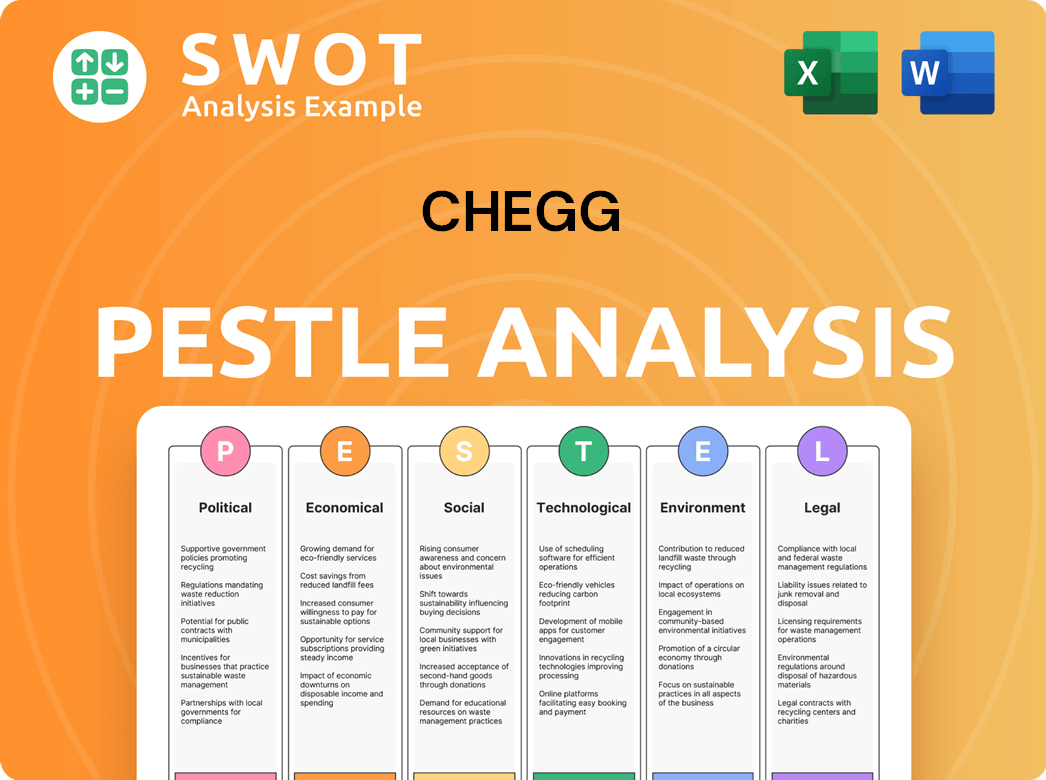
How Is Chegg Positioned in the Market?
The company positions itself as a 'student-first connected learning platform,' aiming to make higher education more affordable and accessible while improving student outcomes. Its brand identity is rooted in providing holistic and differentiated product offerings that blend academic and functional support. This approach includes a focus on organizational proficiency, early career learning, financial literacy, and community, all integrated into an affordable platform designed to address gaps in the student experience.
The company differentiates itself from competitors by developing a single platform that incorporates artificial intelligence verticalized for education, its proprietary learning model, over 100 million pieces of content, and subject matter experts. This positions the company uniquely in the online education market. The company emphasizes its strong reputation for quality and trust, providing what learners precisely need.
The company appeals to its target audience—students in high school and college—by offering solutions that help them learn more in less time and at a lower cost. This value proposition is reinforced by services like 24/7 support in writing and math, personalized learning, and step-by-step guided help combining human experts and supplemental AI. Despite challenges like declining subscriber numbers, the company maintains that its brand and product experience are resilient.
The company's Chegg sales strategy focuses on attracting and retaining students through a subscription model. It emphasizes the value proposition of helping students learn more effectively and affordably. The strategy includes offering a wide range of services, from study tools to career resources, to meet diverse student needs.
The Chegg marketing strategy employs a multi-channel approach to reach its target audience. This includes digital marketing tactics, content marketing, and social media engagement. The company uses data analytics to understand student behavior and optimize its marketing campaigns. A key element is the use of AI to enhance educational offerings and deepen student engagement.
The company's approach to online education is centered on providing a comprehensive and integrated learning experience. It combines academic support with resources for career development and financial literacy. This holistic approach aims to address the various needs of students throughout their educational journey. The company leverages technology, including AI, to personalize learning and improve outcomes.
The company's competitive advantages include its strong brand reputation, extensive content library, and integrated platform. It differentiates itself through the use of AI, its proprietary learning model, and subject matter experts. The company's focus on affordability and accessibility also sets it apart. The company’s commitment to innovation and student success further strengthens its market position.
The company employs several key strategies to acquire and retain customers. These include strategic partnerships, targeted marketing campaigns, and continuous product innovation. The company's digital marketing tactics are designed to reach students where they are, providing relevant and valuable content. The company's student subscription model is a core component of its business model.
- Customer Acquisition: The company focuses on SEO strategy for student acquisition, content marketing, and social media marketing to attract new users.
- Customer Retention: Customer retention strategies include personalized learning experiences, 24/7 support, and continuous improvement of its platform.
- Partnerships and Collaborations: The company forms partnerships with educational institutions and other relevant organizations to expand its reach.
- Marketing Spend Analysis: The company uses data analytics to optimize its marketing spend, focusing on the most effective channels.
- Sales Funnel Optimization: The company continually optimizes its sales funnel to improve conversion rates and drive subscriptions.
- International Expansion: The company explores strategies for international expansion to reach a global audience.
The company's brand consistency is maintained across its various services, which include Chegg Study, Tutoring, Writing Tools, Math Help, Test Prep, Careers Search, Internship Admissions, and College Admissions. For more details on the company's business model, you can explore the Revenue Streams & Business Model of Chegg.
Chegg Business Model Canvas
- Complete 9-Block Business Model Canvas
- Effortlessly Communicate Your Business Strategy
- Investor-Ready BMC Format
- 100% Editable and Customizable
- Clear and Structured Layout
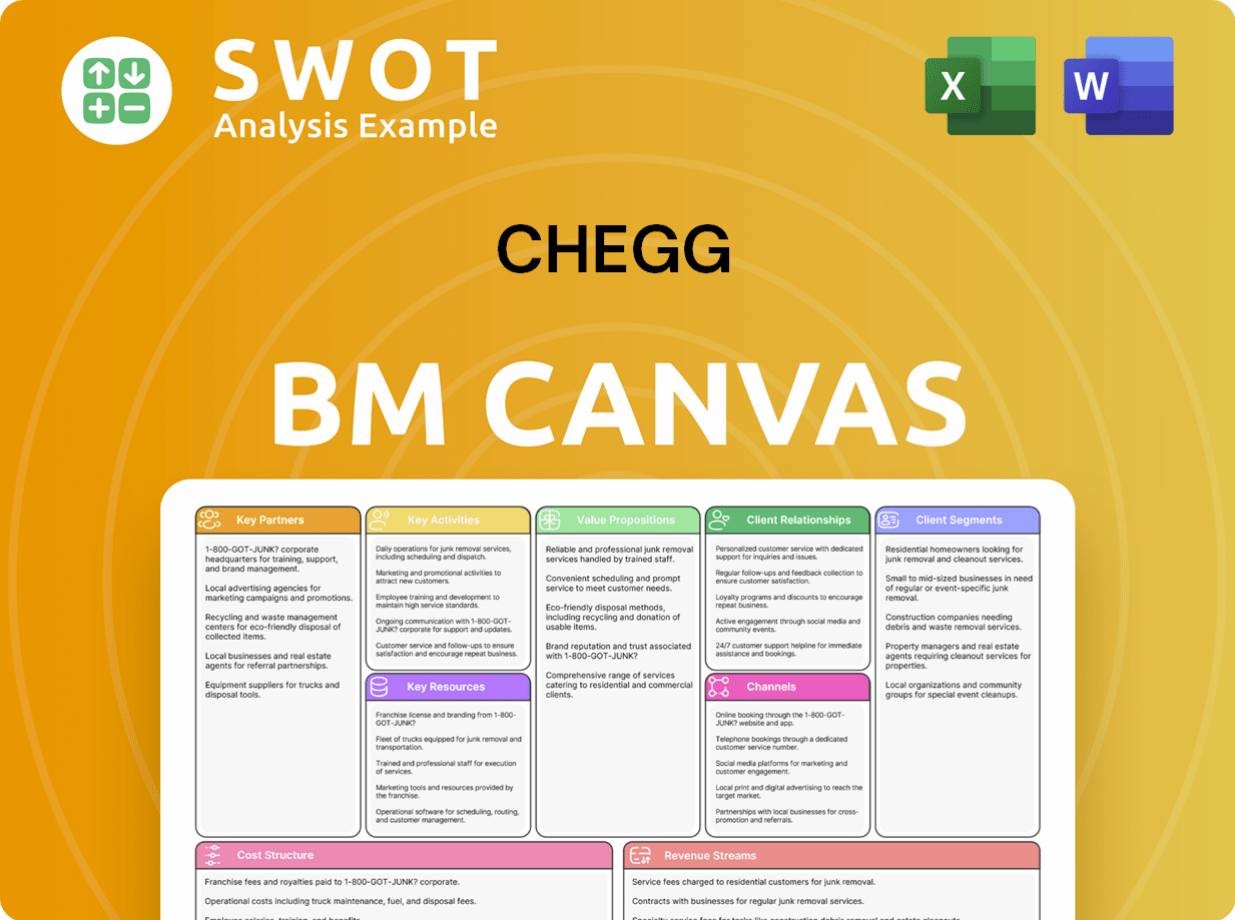
What Are Chegg’s Most Notable Campaigns?
In late 2024, the company initiated a significant brand marketing campaign and activation program. This 'full funnel program' used various channels to boost top-of-funnel traffic and drive conversions. A notable campaign on TikTok resulted in a 16% increase in awareness among underclassmen, showcasing the impact of targeted digital marketing efforts.
The success of the TikTok campaign, demonstrated by improved click-through and conversion rates, prompted the company to plan on doubling down on this strategy in 2025. This approach highlights a focus on direct engagement and measurable outcomes, which is a key component of the overall Chegg sales strategy.
Beyond specific campaigns, the company's strategy includes building brand awareness, driving qualified traffic, and increasing conversion rates. The integration of AI into its product offerings, such as the AI-powered Question and Answer experience and the Solution Scout tool, can be seen as a product-led 'campaign' to enhance user value.
The 2024 TikTok campaign saw a 16% rise in awareness among underclassmen. This demonstrates the effectiveness of social media marketing for reaching the
The launch of AI-powered features like the Question and Answer experience and Solution Scout is a product-led initiative. These tools aim to enhance the value proposition and drive user engagement, influencing the
The company is expanding its business-to-institution programs and content licensing deals. The aim is to partner with approximately 35 additional institutions by the end of 2025, representing a strategic move for market expansion.
In February 2025, a legal complaint was filed against Google LLC and Alphabet Inc. This defensive campaign addresses market challenges, specifically regarding traffic retention by Google's AI Overviews.
Chegg Porter's Five Forces Analysis
- Covers All 5 Competitive Forces in Detail
- Structured for Consultants, Students, and Founders
- 100% Editable in Microsoft Word & Excel
- Instant Digital Download – Use Immediately
- Compatible with Mac & PC – Fully Unlocked
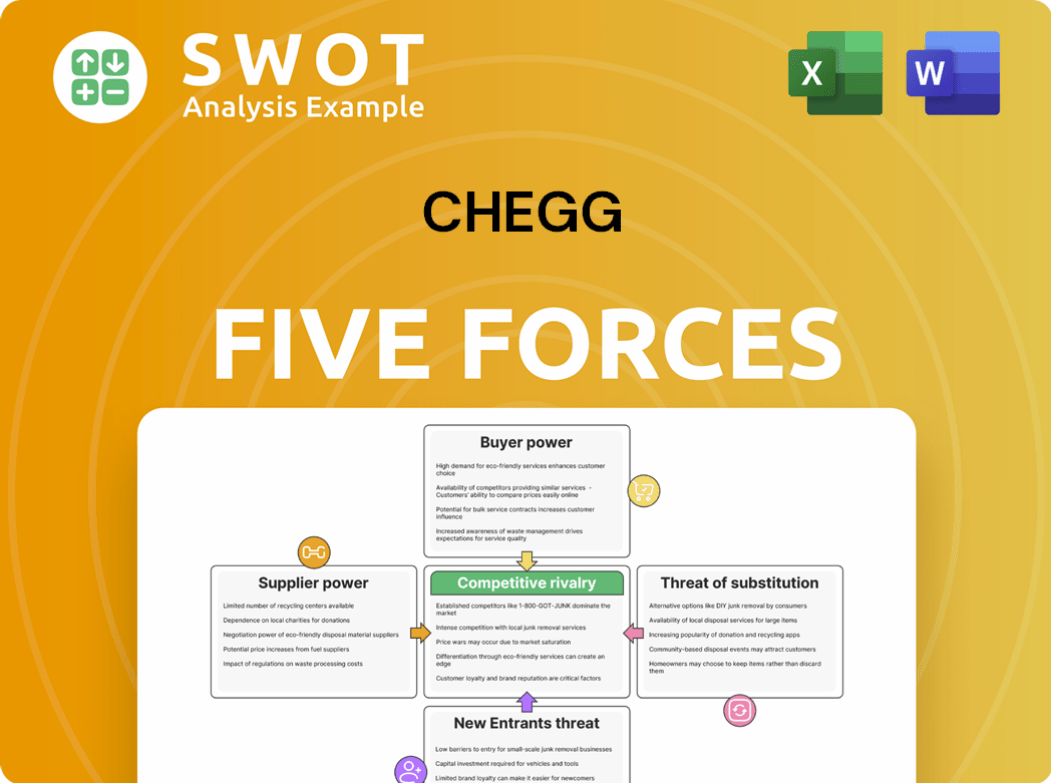
Related Blogs
- What are Mission Vision & Core Values of Chegg Company?
- What is Competitive Landscape of Chegg Company?
- What is Growth Strategy and Future Prospects of Chegg Company?
- How Does Chegg Company Work?
- What is Brief History of Chegg Company?
- Who Owns Chegg Company?
- What is Customer Demographics and Target Market of Chegg Company?
Disclaimer
All information, articles, and product details provided on this website are for general informational and educational purposes only. We do not claim any ownership over, nor do we intend to infringe upon, any trademarks, copyrights, logos, brand names, or other intellectual property mentioned or depicted on this site. Such intellectual property remains the property of its respective owners, and any references here are made solely for identification or informational purposes, without implying any affiliation, endorsement, or partnership.
We make no representations or warranties, express or implied, regarding the accuracy, completeness, or suitability of any content or products presented. Nothing on this website should be construed as legal, tax, investment, financial, medical, or other professional advice. In addition, no part of this site—including articles or product references—constitutes a solicitation, recommendation, endorsement, advertisement, or offer to buy or sell any securities, franchises, or other financial instruments, particularly in jurisdictions where such activity would be unlawful.
All content is of a general nature and may not address the specific circumstances of any individual or entity. It is not a substitute for professional advice or services. Any actions you take based on the information provided here are strictly at your own risk. You accept full responsibility for any decisions or outcomes arising from your use of this website and agree to release us from any liability in connection with your use of, or reliance upon, the content or products found herein.